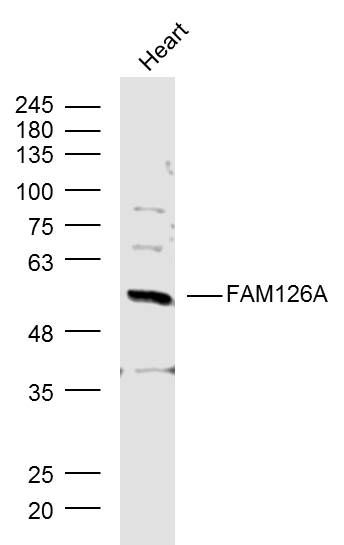FAM126A Polyclonal Antibody
Purified Rabbit Polyclonal Antibody (Pab)
- SPECIFICATION
- CITATIONS
- PROTOCOLS
- BACKGROUND

Application
| WB, IHC-P, IHC-F, IF, ICC, E |
|---|---|
| Primary Accession | Q9BYI3 |
| Reactivity | Rat, Pig, Dog |
| Host | Rabbit |
| Clonality | Polyclonal |
| Calculated MW | 58 KDa |
| Physical State | Liquid |
| Immunogen | KLH conjugated synthetic peptide derived from human FAM126A |
| Epitope Specificity | 1-100/521 |
| Isotype | IgG |
| Purity | affinity purified by Protein A |
| Buffer | 0.01M TBS (pH7.4) with 1% BSA, 0.02% Proclin300 and 50% Glycerol. |
| SUBCELLULAR LOCATION | Cytoplasm. Membrane. According to PubMed:10910037, it is mainly cytoplasmic while according to PubMed:16951682, it is a membrane protein. |
| SIMILARITY | Belongs to the FAM126 family. |
| DISEASE | Defects in FAM126A are the cause of leukodystrophy hypomyelinating type 5 (HLD5) [MIM:610532]. This disorder is characterized by congenital cataract, progressive neurologic impairment, and diffuse myelin deficiency. Affected individuals experience progressive pyramidal and cerebellar dysfunction, muscle weakness and wasting prevailingly in the lower limbs. Mental deficiency ranges from mild to moderate. |
| Important Note | This product as supplied is intended for research use only, not for use in human, therapeutic or diagnostic applications. |
| Background Descriptions | Hyccin is a 521 amino acid cytoplasmic protein that is widely expressed with highest levels found in heart, brain, placenta, spleen and testis. Belonging to the FAM126 family, hyccin may play a role in the ∫-catenin/Lef signaling pathway. Hyccin is likely involved in the process of myelination of the central and peripheral nervous system. Defects in the gene encoding hyccin are the cause of leukodystrophy hypomyelinating type 5 (HLD5), which is characterized by congenital cataract, progressive neurologic impairment and diffuse myelin deficiency. Individuals affected by HLD5 experience progressive pyramidal and cerebellar dysfunction along with muscle weakness in the lower limbs. Hyccin exists as two alternatively spliced isoforms and is encoded by a gene located on human chromosome 7. |
| Gene ID | 84668 |
|---|---|
| Other Names | Hyccin, Down-regulated by CTNNB1 protein A, Protein FAM126A, FAM126A, DRCTNNB1A {ECO:0000303|PubMed:10910037} |
| Target/Specificity | Widely expressed. Highest levels in heart, brain, placenta, spleen and testis. |
| Dilution | WB=1:500-2000,IHC-P=1:100-500,IHC-F=1:100-500,ICC=1:100-500,IF=1:100-500,ELISA=1:5000-10000 |
| Storage | Store at -20 ℃ for one year. Avoid repeated freeze/thaw cycles. When reconstituted in sterile pH 7.4 0.01M PBS or diluent of antibody the antibody is stable for at least two weeks at 2-4 ℃. |
| Name | HYCC1 (HGNC:24587) |
|---|---|
| Function | Component of a complex required to localize phosphatidylinositol 4-kinase (PI4K) to the plasma membrane (PubMed:26571211). The complex acts as a regulator of phosphatidylinositol 4-phosphate (PtdIns(4)P) synthesis (PubMed:26571211). HYCC1 plays a key role in oligodendrocytes formation, a cell type with expanded plasma membrane that requires generation of PtdIns(4)P (PubMed:26571211). Its role in oligodendrocytes formation probably explains its importance in myelination of the central and peripheral nervous system (PubMed:16951682, PubMed:26571211). May also have a role in the beta- catenin/Lef signaling pathway (Probable). |
| Cellular Location | Cytoplasm, cytosol. Cell membrane Note=Localizes to the cytosol and is recruited to the plasma membrane following interaction with other components of the phosphatidylinositol 4-kinase (PI4K) complex. |
| Tissue Location | Widely expressed. Highest levels in heart, brain, placenta, spleen and testis. |

Thousands of laboratories across the world have published research that depended on the performance of antibodies from Abcepta to advance their research. Check out links to articles that cite our products in major peer-reviewed journals, organized by research category.
info@abcepta.com, and receive a free "I Love Antibodies" mug.
Provided below are standard protocols that you may find useful for product applications.
If you have used an Abcepta product and would like to share how it has performed, please click on the "Submit Review" button and provide the requested information. Our staff will examine and post your review and contact you if needed.
If you have any additional inquiries please email technical services at tech@abcepta.com.













 Foundational characteristics of cancer include proliferation, angiogenesis, migration, evasion of apoptosis, and cellular immortality. Find key markers for these cellular processes and antibodies to detect them.
Foundational characteristics of cancer include proliferation, angiogenesis, migration, evasion of apoptosis, and cellular immortality. Find key markers for these cellular processes and antibodies to detect them. The SUMOplot™ Analysis Program predicts and scores sumoylation sites in your protein. SUMOylation is a post-translational modification involved in various cellular processes, such as nuclear-cytosolic transport, transcriptional regulation, apoptosis, protein stability, response to stress, and progression through the cell cycle.
The SUMOplot™ Analysis Program predicts and scores sumoylation sites in your protein. SUMOylation is a post-translational modification involved in various cellular processes, such as nuclear-cytosolic transport, transcriptional regulation, apoptosis, protein stability, response to stress, and progression through the cell cycle. The Autophagy Receptor Motif Plotter predicts and scores autophagy receptor binding sites in your protein. Identifying proteins connected to this pathway is critical to understanding the role of autophagy in physiological as well as pathological processes such as development, differentiation, neurodegenerative diseases, stress, infection, and cancer.
The Autophagy Receptor Motif Plotter predicts and scores autophagy receptor binding sites in your protein. Identifying proteins connected to this pathway is critical to understanding the role of autophagy in physiological as well as pathological processes such as development, differentiation, neurodegenerative diseases, stress, infection, and cancer.


